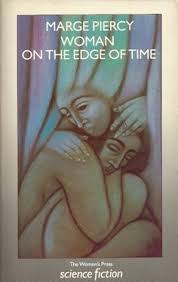The last
time I taught my Utopias half unit, in late 2011, we were in the middle of the
international Occupy movement. Lancaster
had its own Occupy camp, in Dalton Square, and one of my students would cycle
in from it to our seminar on A Modern
Utopia or Herland, and then pedal
busily back to her tent in town to continue the protest. This time round, we are in the midst of
significant political events again, though not of the same international
scale. For the academic pensions strike
is well under way at sixty-odd British universities, and this is becoming as
much a general political protest against the neo-liberal diminution of the very
idea of the university as it is a strike on a specific financial issue.
Two of my
Utopias seminars have fallen casualty to the strike, though I hope the students
have been reading and pondering the texts none the less. The two books involved have certainly been much
on my mind during these weeks of industrial action. The first is Ursula Le Guin’s The Dispossessed, in my view the
greatest of the 1970s utopias. One
sentence in particular leaps out at me, as I re-read under these new
circumstances. After leaving his
anarchist utopia Anarres for capitalist dystopia Urras, Shevek finally makes
contact with the political resistance there and informs them: ‘I came here
because they talk about the lower classes, the working classes, and I thought
that sounds like my people. People who
might help each other’. Well, the kind
of white working-class community in which I grew up half a century or so ago
barely exists in its old form any more, but new communities form themselves in
new struggles; and certainly the Lancaster University union picket line, as it
has evolved over the last few weeks, has come to feel like ‘my people. People who might help each other’.
The second
text which will not now get discussed in our seminars is Marge Piercy’s Woman on the Edge of Time, a raw and
powerful book which I have not re-read for several years. Piercy runs utopian time-travelling in the
opposite direction to Bellamy and Morris: Luciente here travels back from a utopian future to the racist
nightmare which is the 1970s New York faced by Connie Ramos. The utopian visitor from Matapoisett brings
hope and wisdom, but she is a frail ontological presence too: ‘We are only one
possible future. Do you grasp?’ For it turns out that the utopians need
Connie as much as she needs them: ‘You may fail us … You of your time … You of
your time may fail to struggle altogether’.
Or, as Luciente had earlier asked her: ‘How come you took so long to get
together and start fighting for what was yours?’
That is a
question we on the picket line have been asking ourselves too. How has it taken so long to mount collective
resistance to the neo-liberal university on this scale? For in and beyond the pensions issue itself,
we are now fighting for utopia too: for a transformed notion of the university
which would break from the marketised dystopia of the present, without just
reverting to old-style liberal definitions of the institution either. This is as yet a frail utopia, facing
enormous hostile political and economic forces.
Yet if the new community of resistance which has come into being remains
‘true to one another’ – to wrench Matthew Arnold’s phrase from ‘Dover Beach’
out of context – and if we can involve our students in our arguments and
vision, then perhaps we too can open the present to intimations of a better
future.









